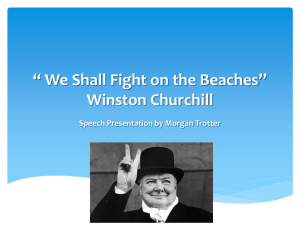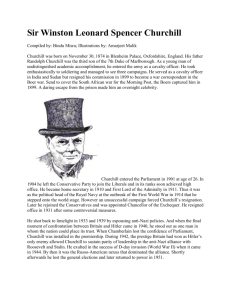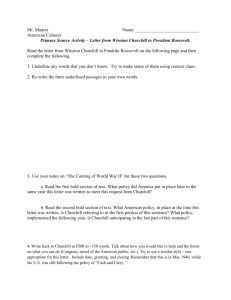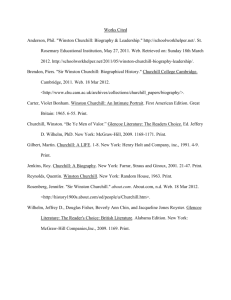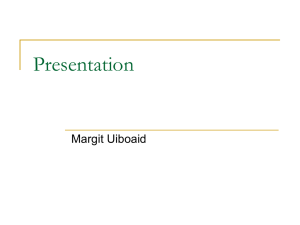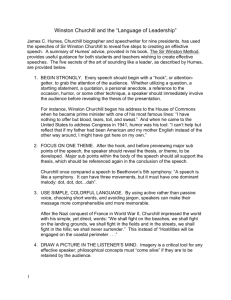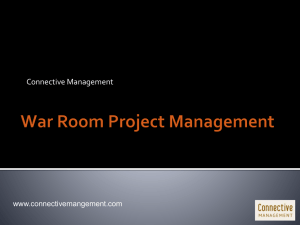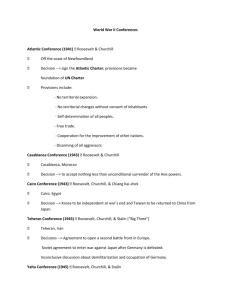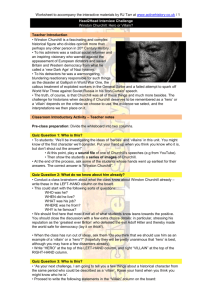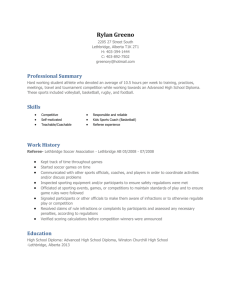Works Cited "The Atlantic Charter." National Archives. U.S. National
advertisement
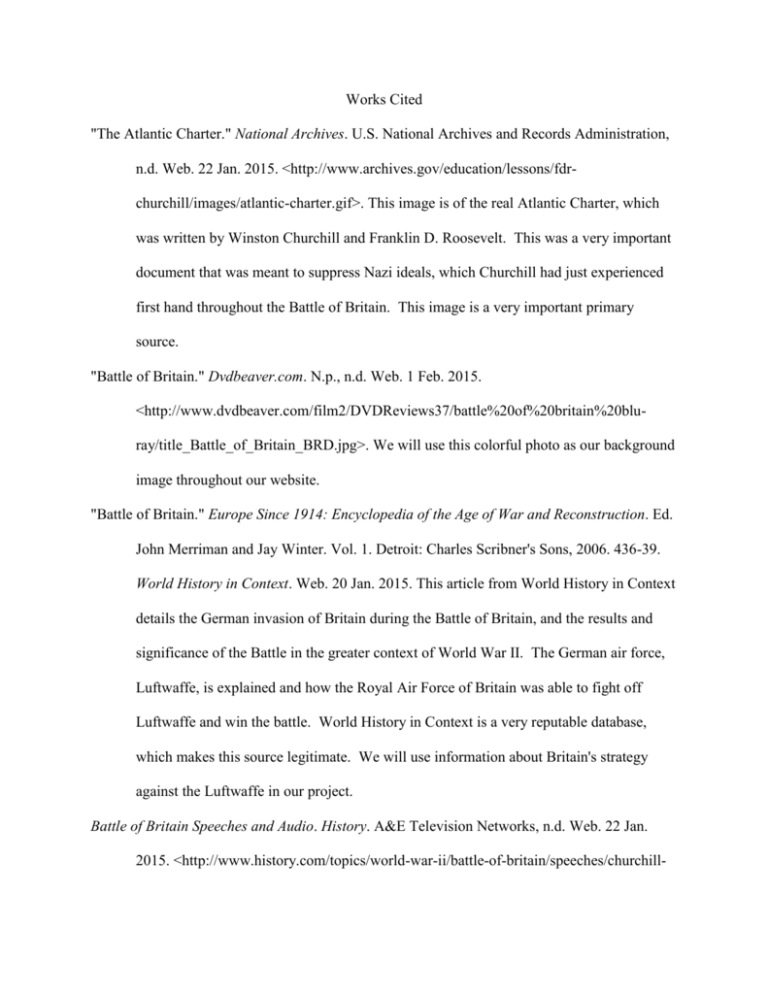
Works Cited "The Atlantic Charter." National Archives. U.S. National Archives and Records Administration, n.d. Web. 22 Jan. 2015. <http://www.archives.gov/education/lessons/fdrchurchill/images/atlantic-charter.gif>. This image is of the real Atlantic Charter, which was written by Winston Churchill and Franklin D. Roosevelt. This was a very important document that was meant to suppress Nazi ideals, which Churchill had just experienced first hand throughout the Battle of Britain. This image is a very important primary source. "Battle of Britain." Dvdbeaver.com. N.p., n.d. Web. 1 Feb. 2015. <http://www.dvdbeaver.com/film2/DVDReviews37/battle%20of%20britain%20bluray/title_Battle_of_Britain_BRD.jpg>. We will use this colorful photo as our background image throughout our website. "Battle of Britain." Europe Since 1914: Encyclopedia of the Age of War and Reconstruction. Ed. John Merriman and Jay Winter. Vol. 1. Detroit: Charles Scribner's Sons, 2006. 436-39. World History in Context. Web. 20 Jan. 2015. This article from World History in Context details the German invasion of Britain during the Battle of Britain, and the results and significance of the Battle in the greater context of World War II. The German air force, Luftwaffe, is explained and how the Royal Air Force of Britain was able to fight off Luftwaffe and win the battle. World History in Context is a very reputable database, which makes this source legitimate. We will use information about Britain's strategy against the Luftwaffe in our project. Battle of Britain Speeches and Audio. History. A&E Television Networks, n.d. Web. 22 Jan. 2015. <http://www.history.com/topics/world-war-ii/battle-of-britain/speeches/churchill- prepares-for-german-invasion-ofbritain?m=52af5724c3c2e&s=undefined&f=1&free=false>. The History Channel website has clips of speeches made during the Battle of Britain, one of which is Churchill's "We shall fight on the beaches" speech. Hearing this speech is an invaluable primary source. Bungay, Stephen. "His Speeches: How Churchill Did It." WinstonChurchill.org. The Churchill Centre, n.d. Web. 17 Dec. 2014. <http://www.winstonchurchill.org/>. The Churchill Centre is dedicated to preserving the life and ideas of Winston Churchill in an accurate and objective way. This article, devoted to Churchill's speeches, explains and analyzes the importance and lasting effect of Churchill's riveting speeches that still exists today. The author of this article, Stephen Bungay, is a British historian and author who specializes in the study of the Battle of Britain, making this article very reliable for our research. We will use excerpts from these speeches in our NHD Project to display Churchill's tremendous speaking abilities. Churchill, Winston. "Churchill, Winston." 1940. Speech. This article written by Barbara C. Bigelow, author of the World War II Reference Library, explains the circumstances around Churchill's delivery of speeches during the Battle of Britain. However, the primary reason we used this article was for real speech excerpts, which we will analyze as part of Churchill's leadership qualities. Speeches that we found useful include: "Blood, Toil, Tears, and Sweat," "Their Finest Hour," and "Be Ye Men of Valour." We found this article very reliable, as it was written by Bigelow, the author of a comprehensive and detailed summary of World War II, and we will use this as a primary source for some of Churchill's famous speeches. Goldsmith-Carter, George. The Battle of Britain. London: Mason & Lipscomb, 1974. Print. A great historical book about the battle of Britain. For those looking for information purely on the battle, this is a good source, it may not be a very useful source for someone trying to find information on Churchill alone, because although it talks about his role in the battle, he is not the focus so there is not that much information on him. Once again, for those interested in the Battle of Britain, this is a great resource. History.com Staff. "Winston S./ Churchill." History.com. A+E Networks, 2009. Web. 18 Dec. 2014. The History Channel website (History.com) provided us with a detailed yet concise overview of Churchill's actions during World War II. From this website, we gathered important information about Churchill's impact on his people over the radio and his negotiations with U.S. President Franklin D. Roosevelt. The History.com website is very reliable because it stems from the History Channel, which specializes in the presentation and analysis of nearly everything in history. Hough, Richard, and Denis Richards. The Battle of Britain: The Greatest Air Battle of World War II. New York: W.W. Norton & Company, 1989. Print. This extremely comprehensive book goes into great depth about the Battle of Britain and all of the encounters between the British and the Nazis. This book was written in part by Denis Richards, a historian focused on chronicling the British Royal Air Force, which was very active during the Battle of Britain. This fact makes this source very reliable. Mosley, Leonard. The Battle of Britain. Canada: Time-Life, 1977. Print. This book is largely comprised of pictures, which gives us lots of great visuals, but not much textual information. This book is very reliable because it was written by Leonard Mosley, an award-winning reporter who wrote more than twenty books. Overall, this book gave us little concrete information about the Battle of Britain itself, but is highly recommended for its visual content. Parkinson, Roger. Summer, 1940: The Battle of Britain. New York: David McKay Company, 1977. Print. This book goes into detail about the circumstances surrounding the Battle of Britain (such as the fall of France), and takes us through the air battles that symbolized the Battle of Britain. Because of the age of this book (nearly 40 years old), it seems less reliable to us than some other sources, however we still believe the content of the book is accurate and potentially useful. Roosevelt, Franklin D., and Winston Churchill. "The Atlantic Charter." Placentia Bay, Newfoundland. 14 Aug. 1941. Reading. After experiencing Nazi invasion first hand in 1940, Winston Churchill contacted U.S. President Franklin D. Roosevelt to discuss common governing principles all nations should have. This source is the actual Atlantic Charter that the two leaders wrote and discussed, which details the rights of all nations (this was in an effort to discourage Nazi-type governing). Because this is a primary source, this is an authentic and reliable source of information. "Sir Winston Churchill." Britannica School.Encyclopædia Britannica, Inc., 2014. Web. 18 Dec. 2014. <http://school.eb.com/levels/high/article/108565>. A purely factual article with a basic summary of Churchill, good for anyone who wants a simple and relatively short piece of background reading on Churchill, but there is not much in depth information. Stanley, Tim. "Winston Churchill, an all-American hero." The Telegraph 31 Oct. 2013 The Telegraph. Web. 19 Jan. 2015. <http://www.telegraph.co.uk/news/worldnews/northamerica/usa/10417854/WinstonChurchill-an-all-American-hero.html>. This article from October of 2013 details the followers that Winston Churchill still has in America, as there was a ceremony honoring the great leader in Washington DC. Such an event displays Churchill's lasting legacy in America, which was not even the country he was from. This article outlines the ceremony and how Churchill still has American followers to this day. This source evidences Churchill's overall legacy. "Teaching With Documents: Documents Related to Churchill and FDR." National Archives. N.p.: n.p., n.d. N. pag. National Archives. Web. 22 Dec. 2014. A good, honest document relating to both Churchill and Roosevelt, both comparing the two and explaining their complex relation. For anyone who is doing research on Roosevelt or Churchill, or is just interested in their lives. Wheatley, John, and Robert Mcjimsey. "Churchill: Was Winston Churchill a Great War Leader?" History in Dispute. Ed. Dennis Showalter. Vols. 4: World War II, 1939-1943. Detroit: St. James, 2000. 40-45. World History in Context. Web. 13 Dec. 2014. This article debates over whether Winston Churchill was a great war leader or not. Wheatley and Mcjimsey offer both perspectives on the argument and provide evidence for each side. Though the authors lived a relatively long time ago (Wheatley died in the 1930s), the source still provides great evidence for both arguments and was extremely useful for us in providing the big picture of Churchill's life and the World War II circumstances. "Winston Churchill." Contemporary Heroes and Heroines. Vol. 2. Detroit: Gale, 1992. N. pag. Biography in Context. Web. 13 Dec. 2014. This article from the Biography in Context database provided us with an extremely detailed account of Churchill's entire life, including childhood, his war career, and his career as a politician. This is a very reliable source, as it comes from a reputable database (Biography in Context). This overview of Churchill's entire life helped us narrow our focus down to Churchill's leadership and legacy around the time of the Battle of Britain. "Winston Churchill and Franklin Roosevelt." Telegraph.co.uk. N.p., n.d. Web. 26 Jan. 2015. <http://www.telegraph.co.uk/finance/comment/3155122/Global-financial-crisis-does-theworld-need-a-new-banking-policeman.html>. This photo demonstrates the alliance between Churchill and FDR, and we will put this image on our website. Winston Churchill Broadcast - Finest Hour Speech. BBC. BBC, n.d. Web. 22 Jan. 2015. <http://www.bbc.co.uk/archive/battleofbritain/11428.shtml>. This audio recording of Churchill's "Their Finest Hour" speech captures one of the most influential and important speeches of World War II. On the heels of French conquest, the Nazis were rapidly approaching the English Channel, with their sights set on Britain. This authentic audio recording is a great primary source, and shows just how skilled of an orator Churchill was. Winston Churchill "Finest Hour" (Best Version). youtube.com. N.p., n.d. Web. 1 Feb. 2015. <https://www.youtube.com/watch?x-ytcl=85114404&v=G4BVzYGeF0M&feature=player_embedded&x-yt-ts=1422579428>. The "finest hour" speech, perhaps Churchill's most famous and lasting speech, illustrates Churchill's legendary persuasive ability. "Winston Churchill - If You're Going through Hell Keep Going." Epicwpp.com. N.p., n.d. Web. 26 Jan. 2015. <http://epicwpp.com/inspirational/if-youre-going-through-hell-keepgoing/>. We will use this image on our website to illustrate the remarkable effect of Churchill's words. "Winston Churchill Quotes." Quotespin.com. N.p., n.d. Web. 26 Jan. 2015. <http://www.quotespin.com/85-winston-churchill/20597-winston-churchill-quotes/>. We will use this photo in our website to display some of Churchill's famous words from his speeches. Winston Churchill - We Shall Fight Them on the Beaches. youtube.com. N.p., n.d. Web. 1 Feb. 2015. <https://www.youtube.com/watch?v=5IHadByMvXk&x-ytts=1422579428&feature=player_embedded&x-yt-cl=85114404>. This video shows the true impact of Churchill's speeches (this video is about the "beaches" speech he made in 1940). We will use this to demonstrate Churchill's oratory skill. "Winston S. Churchill, Prime Minister of Great Britain, 1940--1945, 1951--1955." The Cold War--1945-1991. N.p.: Gale, 1992. N. pag. World History in Context. Web. 13 Dec. 2014. This article is a summary of Churchill's life, but with a particular focus on World War II and the Battle of Britain. This article helped us narrow our topic choice down to specifically the Battle of Britain and its surrounding circumstances. This source is very reliable, as it comes from World History in Context, a well-known database.
